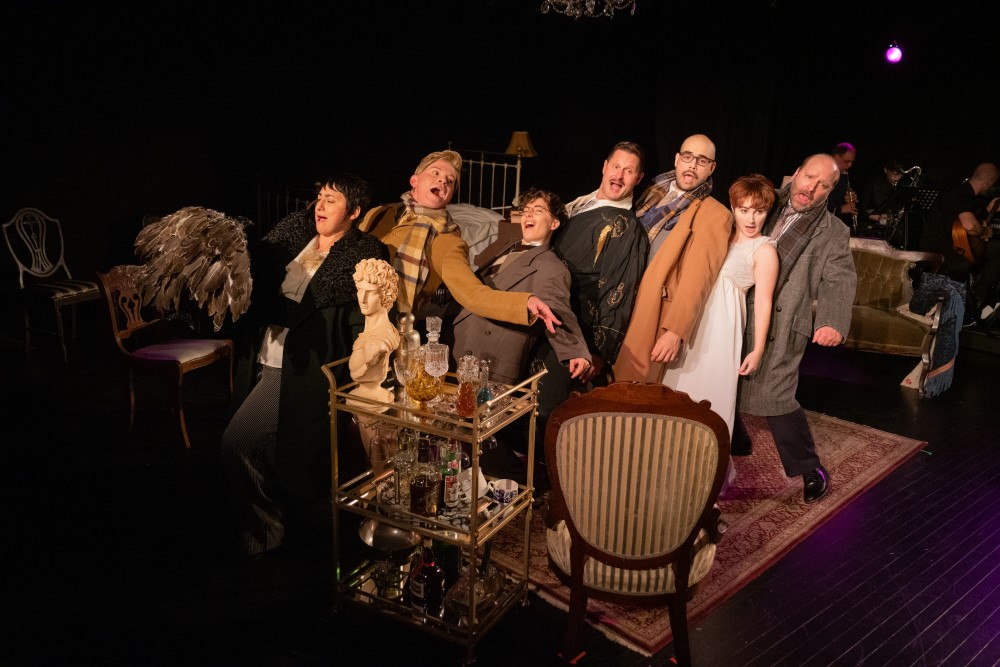
Shira Cahn Lipman, Matt Finn, Shai Wolf, Todd Sandstrom, Travis Karas, Em Sheeran, Todd Yard. Photo credit: Val Tracy
Presented by The Treehouse Collective
Music and lyrics by Gabriel Kahane
Story by Seth Bockley
Directed by Katie Swimm
Music direction by Jeff Kimball
Costume design by Marc Capizzi and Christina Petrillo
Set/props design by Britt Ambruson
Lighting design by Dan Clawson
Stage management and sound design by Dannie Smith
Featuring: Todd Sandstrom, Em Sheeran, Todd Yard, Shai Wolf, Travis Karas, Matty Finn, Sean Donnelly, Shira Cahn-Lipman, Devin Bean, Maggie Post
September 27 – October 13
Plaza Theatres at Boston Center for the Arts
539 Tremont Street
Boston, MA 02131
Critique by Maegan Bergeron-Clearwood
BOSTON — I didn’t find myself humming snippets from February House on my rainy walk back to the train station last night, because Gabriel Kahane’s score isn’t particularly catchy. The music is memorable, to be sure, but not in the brash, ear-wormy way that one might expect from a musical.
Instead, my memories of February House felt quiet and fleeting, like the smell of an old house or the footsteps of a once-familiar companion. As George Davis (the titular house’s den mother and the musical’s narrator) explains, love is not about possession, but about letting go, and to that end, the Treehouse Collective’s quiet but piercing production of this musical is resoundingly successful.
February House is based on Sherill Tippins’ biography of Davis and his menagerie of bohemian companions, all of whom lived under one roof in Brooklyn, New York between 1940 and 1941. The musical premiered off-Broadway at the Public in 2012, and I’m grateful that it found a cozy home at the BCA this fall. Director Katie Swimm has tapped into the text’s uniquely meditative charms, resulting in a production that lingers in all the right places and cares more about intimate details than sweeping song-and-dance numbers: Davis wrapping a blanket around a friend’s shoulders; the clink of tumbler glasses; a breath of sharp winter air.
Kahane’s score is similarly detail-oriented, featuring a series of distinct but harmonious motifs for the various housemates, including riffs on operetta, ragtime, and most excitingly, bluegrass (yes, a banjo features heavily in the orchestrations, making for an enjoyable and utterly unique musical theatre listening experience). Seth Bockley’s book is equally stunning, with lyrical, character-establishing dialogue that is woven smoothly into the broader musical tapestry.
The music serves as a charming metaphor for the simple but compelling ensemble story. Literary editor and writer Davis reflects on this remarkable year of his life, constructing the dilapidated but beloved house one antique chair (set and prop design by Britt Ambruson) and one new friend at a time. By the middle of act one, the brownstone is packed with twentieth century icons: Carson McCullers, W.H. Auden, Benjamin Britten, and even Gypsy Rose Lee. As anyone who has ever experienced communal living could have seen coming, chaos abounds: leaky roofs, bed bugs, and other city living woes, but also creative strife, romantic flings, and political debates.
In lieu of a singular, central conflict, February House’s characters have an ongoing philosophical dilemma: what is an artist’s responsibility in a time of violent political turmoil? The housemates are queer counter culturalists who can barely make rent, but they do enjoy a certain degree of privilege: they are white, educated, and to varying degrees disconnected from the fascist uprisings in Europe, so for audiences, their political debates may feel timely and poignant or simply pretentious and out of touch.
Early in the play, Davis describes life as an act of paying rent, and it’s hard not to compare February House to the much flashier musical theatre phenomenon. Like Mark, Roger, and Maureen in RENT, the inhabitants of the February House romanticize their lives as bohemian intellectuals, and they are similarly messy and short-sighted. But, February House carries a degree of self-awareness that RENT misses, and I think is necessary when telling ghost stories about queer ancestors. None of the historical figures in February House were perfect, but they loved and felt deeply, and their lives are still worth exploring.
Luckily, every member of The Treehouse Collective ensemble embodies their characters with nuance and sympathy, even in their messiest moments. To name just a few standouts: Todd Sandstrom as George Davis infuses the narrative with wisdom, heartbreak, and infectious queer joy; Devin Bean brings a vivacious flair and wry wit to Gypsy Rose Lee; Em Sheeran’s delicate vocals are an utter delight, and their portrayal of McCuller’s fleeting but profound queer journey was the narrative cornerstone of my viewing experience; and Travis Karas and Matty Finn are a musical-comedic powerhouse as Benjamin Britten and Peter Pears respectively.
Todd Yard’s (W.H. Auden) sonorous vocals are a particular highlight, but the narrative’s focus on his character reveals one of the musical’s few flaws. Auden is by far the least sympathetic character: his obsession with his much-younger lover Chester (an earnest Shai Wolf) gets significant stage time compared to other more compelling characters (including his wife Erika Mann, played by a formidable Shira Cahn-Lipmann, and Chester himself). Auden’s self-centered approach to love serves as a thematic counterpoint to Davis’, but it drags down a plot that is already meandering (usually enjoyably so).
It’s also worth noting that everyone in the cast looks stunning, sporting impeccably tailored suits and dresses. Costume designers Marc Capizzi and Christina Petrillo put impressive detail into this period piece, collaborating with Ambruson and lighting designer Dan Clawson to create a ghostly, sepia-toned world that never feels musty.
February House is two-and-a-half hours long. It is soft, meditative, even slow, inviting the audience’s attention rather than fighting for it. I’m grateful to have seen it on a rainy night, because this immersive little production felt like a cozy fireside story – a warm reminder that love lingers, no matter how fleeting, no matter how strange.
